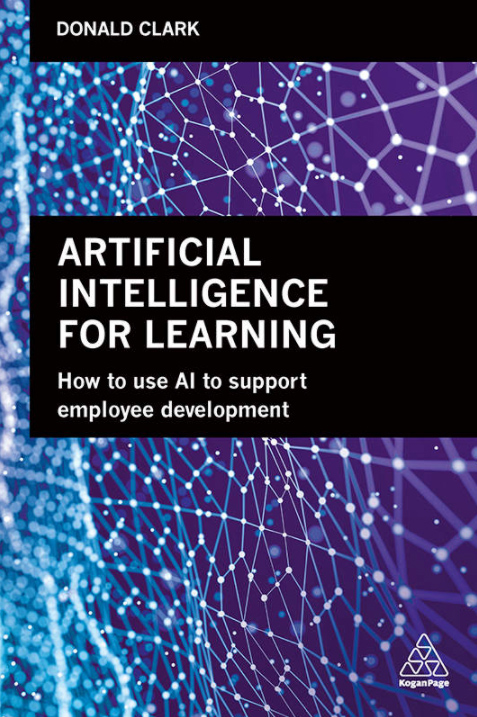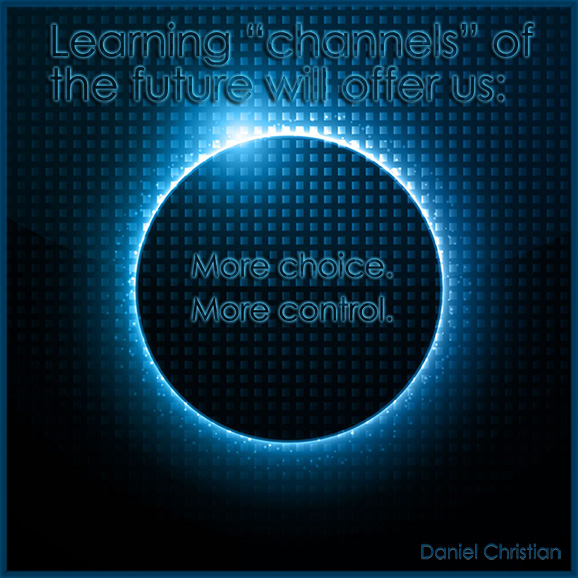Also see:
From DSC:
If this isn’t mind-blowing, I don’t know what is! Some serious morphing lies ahead of us!




DC: This isn’t helping the continued backlash against traditional institutions of higher education.”#highereducation #debt #tuition #learningfromthelivingclassroom #learningecosystems
— Daniel Christian (@dchristian5) September 4, 2020
From DSC:
The perfect storm continues to build against traditional institutions of higher education. The backlash continues to build strength. And there WILL BE change — there’s no choice now. Alternatives to these traditional institutions of higher education continue to appear on the scene.
Over the last several decades, traditional institutions of higher education had the chance to step in and do something. They didn’t take nearly enough action. As in other industries, these days of the Coronavirus just hasten the changes that were already afoot.
Also see:
From DSC:
Below are but some of the changes to the learning ecosystems out there. Certainly, more are coming.
Ex-Google employees form virtual tech ‘school’ for gap year students amid college closures — from cnbc.com by Jennifer Elias
Along these lines, see:
From DSC:
Also, to see some more changes to the learning ecosystems out there, set up a Google Alert (or something similar in Feedly or via another tool) for “Learning Pods,” “Pandemic Pods,” and/or the “growth of homeschooling.” Here’s but one recent example:
Life can be very hard for autistic, gifted and special needs learners. Autistic and gifted learners often times struggle in school because they learn very differently than their peers. These special learners need a personalized approach to their education that allows them to learn in their own way at their own pace.
Many times parents and students feel as if they are the only ones like them in the world. This can often times lead to isolation and frustration. It is important for all autistic, gifted and special needs to unite in order to support one another. We are named Academic Warriors because all our students are superheroes in a world that doesn’t always understand and/or appreciate them. We help our students to become strong, independent and positive learners despite what the world may think of them.
It is the mission of Academic Warriors to help create positive learning experiences and communities throughout the United States for autistic, gifted and special needs learners. We offer online courses, programs, private school and in person events that foster an unique learning environment that promotes unity among all our students and families. We strive to create online and in person learning communities in every state that will provide educational opportunities for all families of autistic, gifted and special needs students. Together we can create a better world for the autistic, gifted and special needs learner.
From DSC:
As part of a homeschooling-based situation, my wife received the following item for one of our daughters (who needs additional/personalized assistance to learn). Simultaneously, she and our daughter sent them a Michigan Exchange Box. Very cool.

I believe my wife found this out at the following group in Facebook:
Some channels out on Youtube that have to do with learning:
(and by the way, according to Jane Hart’s recent Top 200 Tools for Learning, YouTube is in the #1 spot for the 5th year in a row!)
“Horse Sense Tutoring Services is a unique resource that combines the power of Equine Assisted Learning with evidence-based reading and math strategies that engage the mind, body, and emotions in learning. We use the principles of discovery, experience, movement, reflection, and connection in partnership with our horse friends.
…
Based at The Barn for Equine Learning…my program offers targeted reading, math, and basic horsemanship tutoring for students in grades K – 8. Horses become teaching and learning partners as students experience academics and social-emotional learning in a whole new way.
If you are looking for a unique tutoring and confidence-building experience for your child, PM for more information. Sessions are held outdoors and/or in an open barn setting.
(Small group field trips with an introduction to basic horsemanship skills are also available).
From DSC:
So these are just a few examples of how the learning ecosystems are changing out there! Surely, there will be more changes coming down the pike.
So what is the book about? — from donaldclarkplanb.blogspot.com by Donald Clark; which discusses his book entitled, Artificial Intelligence for Learning: How to use AI to Support Employee Development

Excerpt:
AI changes everything. It changes how we work, shop, travel, entertain ourselves, socialize, deal with finance and healthcare. When online, AI mediates almost everything – Google, Google Scholar, YouTube, Facebook, Twitter, Instagram, TikTok, Amazon, Netflix. It would be bizarre to imagine that AI will have no role to play in learning – it already has.
Both informally and formally, AI is now embedded in many of the tools real learners use for online learning – we search for knowledge using AI (Google, Google Scholar), we search for practical knowledge using AI (YouTube), Duolingo for languages, and CPD is becoming common on social media, almost all mediated by AI. It is everywhere, just largely invisible. This book is partly about the role of AI in informal learning but it is largely about its existing and potential role in formal learning – in schools, Universities and the workplace. AI changes the world, so it changes why we learn, what we learn and how we learn.
Also see:
From DSC:
Some of the following questions came to my mind recently:
Maybe those aren’t even the right questions…
If not, what do you think? What questions should we be asking about learning these days?
#LXD #learningecosystems #future #lifelonglearning #onlinelearning #highereducation #K12 #corporatelearning #heutagogy
The main thing we need to remember is that this space no longer serves as an accessory to face-to-face teaching. It is now our main contact point with learners, so it needs to play different roles: communication channel, learning path, interaction platform and community space. Teachers therefore need a certain degree of freedom to design this space in the best way that suits their teaching style and philosophy as well as their course content and learning objectives.
…
What became obvious in the past months is that when it comes to teaching and learning fully online, the learning experience design aspect, including look, feel and logic of the platform from the users’ perspective- be it teachers or students-, are at least as important as the content.(source)
Facial Recognition Start-Up Mounts a First Amendment Defense — from nytimes.com by Kashmir Hill
Clearview AI has hired Floyd Abrams, a top lawyer, to help fight claims that selling its data to law enforcement agencies violates privacy laws.
Excerpts:
Litigation against the start-up “has the potential of leading to a major decision about the interrelationship between privacy claims and First Amendment defenses in the 21st century,” Mr. Abrams said in a phone interview. He said the underlying legal questions could one day reach the Supreme Court.
Clearview AI has scraped billions of photos from the internet, including from platforms like LinkedIn and Instagram, and sells access to the resulting database to law enforcement agencies. When an officer uploads a photo or a video image containing a person’s face, the app tries to match the likeness and provides other photos of that person that can be found online.
From DSC:
Many, if not all of us, are now required to be lifelong learners in order to stay marketable. I was struck by that when I read the following excerpt from the above article:
“I’m learning the language,” Mr. Abrams said. “I’ve never used the words ‘facial biometric algorithms’ until this phone call.”
From DSC:
After reading Jeff Young’s article re: learning engineering and seeing the Nudge application from Duke University...it once again occurred to me that we really need a standard for loading questions into a memory-refreshing application. Just like HyperText Markup Language (HTML) made the World Wide Web so successful and impactful, we need an easy-to-use standard for dumping questions into a personalized database of questions for each cloud-based learner profile.
After taking a module, you would be asked if you wanted to be reminded of / quizzed upon the key ideas presented therein. You would then receive periodic quizzes on those items. You can choose to opt-out of that learning module’s content at any time.
Such an application would help reduce the impact of the Ebbinghaus Forgetting Curve. This type of standard/feature would really help students and people in:
A person could invoke a quiz at any point, but would be quizzed at least once a day. If you missed a day, those questions would not be taken out of the pool of questions to ask you. If you got a question right, the time interval would be lengthened before you were asked that question again. But questions that you struggled with would be asked more frequently. This would also help interleave questions and aid in recall. Such spaced repetition would cause struggle from time to time, aiding in deeper learning.
Are universities going the way of CDs and cable TV? — from theatlantic.com by Michael Smith; with thanks to Homa Tavangar & Will Richardson for this resource
Like the entertainment industry, colleges will need to embrace digital services in order to survive.
Excerpts:
We all know how that worked out: From 1999 to 2009, the music industry lost 50 percent of its sales. From 2014 to 2019, roughly 16 million American households canceled their cable subscriptions.
Similar dynamics are at play in higher education today. Universities have long been remarkably stable institutions—so stable that in 2001, by one account, they comprised an astonishing 70 of the 85 institutions in the West that have endured in recognizable form since the 1520s.
That stability has again bred overconfidence, overpricing, and an overreliance on business models tailored to a physical world. Like those entertainment executives, many of us in higher education dismiss the threats that digital technologies pose to the way we work.
Information technology transforms industries by making scarce resources plentiful, forcing customers to rethink the value of established products.

From DSC:
I can’t help but hear Clayton Christenson’s voice in the following quote:
An analogous situation prevails in higher education, where access to classroom seats, faculty experts, and university diplomas have been scarce for half a millennium. When massively open online courses first appeared, making free classes available to anyone with internet access, universities reflexively dismissed the threat. At the time, MOOCs were amateuristic, low-quality, and far removed from our degree-granting programs. But over the past 10 years, the technology has improved greatly.
Are you ready? Self-directed learning is the next wave for L&D — from learningsolutionsmag.com by Bill Brandon
Excerpt:
This article begins an exploration of the other major shift that is already in play and that will continue to affect our work: the phenomenon of self-directed learning. This is a trend that (like distance learning) was already underway before the pandemic, driven by a desire to reduce or eliminate the cost of formal instruction and to keep up with the speed of change itself.
…
What is self-directed learning?
Let’s use the classic definition from Malcolm Knowles. Self-directed learning is a process “in which individuals take the initiative, with or without the help of others, in diagnosing their learning needs, formulating learning goals, identifying human and material resources for learning, choosing and implementing appropriate learning strategies, and evaluating those learning outcomes.” (See reference at the end of this article.)
From DSC:
I’d like to thank Mr. Eric Osterberg — a fraternity brother and friend of mine — for sending me the following article. I wrote back to him. After thanking Eric for the article, I said:
Such an article makes me reflect on things — which is always a good thing for me to try to see my blindspots and/or to think about the good and bad of things. Technologies are becoming more powerful and integrated into our lives — for better at times and for worse at other times.
I’m wondering how the legal realm can assist and/or help create a positive future for societies throughout the globe…any thoughts?
Can computers ever replace the classroom? — from theguardian.com by Alex Beard
With 850 million children worldwide shut out of schools, tech evangelists claim now is the time for AI education. But as the technology’s power grows, so too do the dangers that come with it.
Excerpts:
But it’s in China, where President Xi Jinping has called for the nation to lead the world in AI innovation by 2030, that the fastest progress is being made. In 2018 alone, Li told me, 60 new AI companies entered China’s private education market. Squirrel AI is part of this new generation of education start-ups. The company has already enrolled 2 million student users, opened 2,600 learning centres in 700 cities across China, and raised $150m from investors.
…
The supposed AI education revolution is not here yet, and it is likely that the majority of projects will collapse under the weight of their own hype.
The point, in short, is that AI doesn’t have to match the general intelligence of humans to be useful – or indeed powerful. This is both the promise of AI, and the danger it poses.
It was a reminder that Squirrel AI’s platform, like those of its competitors worldwide, doesn’t have to be better than the best human teachers – to improve people’s lives, it just needs to be good enough, at the right price, to supplement what we’ve got. The problem is that it is hard to see technology companies stopping there. For better and worse, their ambitions are bigger. “We could make a lot of geniuses,” Li told me.
#heutagogy For those with some time to spare, here is my Keynote at the SOTEL Symposium in Auckland a couple of weeks ago. https://t.co/5xj9Km2q3s
— Stewart Hase (@stewarthase) February 29, 2020
Notes from Stewart Hase’s keynote (Feb 2020) — with thanks to Dr. Lisa Marie Blaschke in Germany for her Tweet on this
Creating learning experiences where people are not sausages. Policymakers don’t get it. Practitioners do.
~11:00 mark –> Learner agency; have control over what they can learn about (inserted graphic from DSC below)

Heutagogy (self-determined learning)
PAH continuum – Pedagogy –> Andragogy –> Heutagogy
Hobby – learned to do it but didn’t go to school for it. How did you go about learning it?
Kids know how to do heutagogy – very natural; self-determined learning.
~21:45 To what extent do we incorporate heutagogy into our classrooms?
The learning leader: New skills
The 5 top tech skills companies want in new hires right now — from fortune.com by Anne Fisher; with thanks to Ryan Craig for his relaying this resource
Excerpts (emphasis DSC):
Tim Tully agrees. Chief technology officer at data giant Splunk—whose clients number 92 of the Fortune 100—Tully says that the most important trait IT job candidates need now is “a strong desire to learn.” It might be too broad of a requirement, but consider Tully’s own list of the five most essential tech skills now:
1. Real-time data management
2. Design thinking
3. App development
4. A.I. and machine learning
5. A composite of the first four skills
From DSC:
I’m especially posting this for students who are considering a tech-related career. If that’s you, Tim’s words ring true — you must have a strong desire to learn. And I would add, to keep learning and to keep learning and to keep learning…
If you are in IT, it’s wise to check in regularly on career progress – because staying still for too long could quickly lead to falling behind. (source)
Also, given the pace of change and today’s current marketplace, you need to be ready to be let go and take a right turn (i.e., be flexible and adaptable). You need to have a healthy learning ecosystem built up and maintained — one that will support you over the long haul. Heutagogy comes into play here. And at least for me, prayer helps greatly here too — as one can easily put one’s eggs into the wrong basket(s) when we’re talking about tech-related jobs.
And for you applying for jobs, don’t get discouraged by those organizations/people who are looking for those “purple unicorns” that Ryan Craig talks about in his Gap Letter Volume II, #4 (i.e., the perfect candidate who meets a ridiculously long list of requirements for the job).
Also see:
Below is a relevant excerpt from that report:
Soros urges world leaders to back his $1-billion Global Education Network — from chronicle.com by Dan Parks
Excerpt:
George Soros urged world leaders on Thursday to back his Open Society University Network, a $1-billion effort to integrate teaching and research across higher-education institutions worldwide to solve big problems.
…
The Central European University, which Soros founded, and Bard College will team up with Arizona State University and other institutions around the globe, according to a news release.
From DSC:
This is not an endorsement of the GEN nor do I have any perspectives to relay one way or another re: George Soros. I just find the idea of a global learning network/platform very interesting…and likely a piece of our future learning ecosystems.
DC: Precursor to a next gen learning platform…? I think it's one of the pieces of the puzzle that's coming together.
Google just revealed that 500M people around the world are using Google Assistant.https://t.co/6uHXUUIYVb#AI #global #NLP #InstructionalDesign #learning pic.twitter.com/hSp0sa79k3
— Daniel Christian (@dchristian5) January 11, 2020
Some of the topics/items mentioned include: